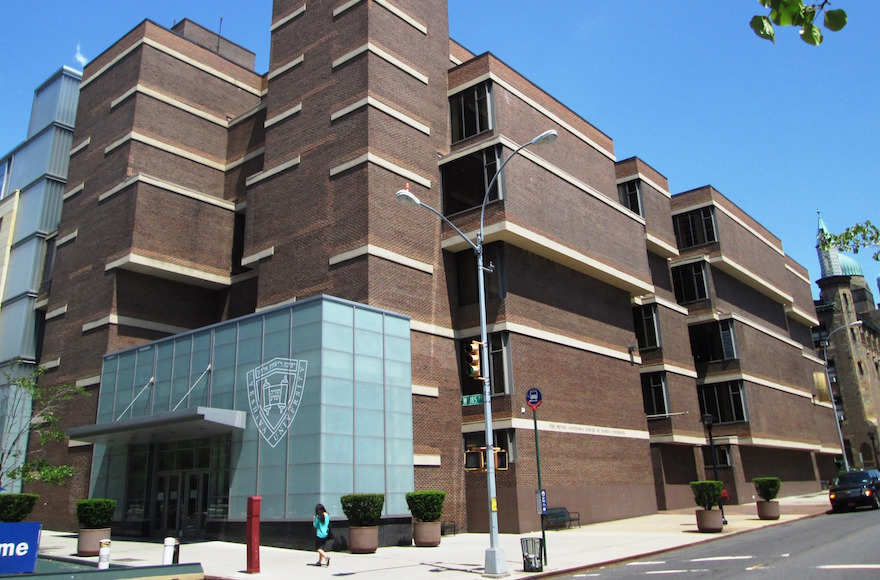(New York Jewish Week via JTA) — While its basketball team has been amassing a historic winning streak, Yeshiva University has been on a spree of its own, raising more than $250 million over the last two years in the “quiet phase” of a fundraising campaign.
Now, the flagship Modern Orthodox university has announced it wants to raise more than $350 million more, bringing the total yield of its new, five-year “Rise Up” campaign to $613 million.
The campaign will generate resources across Y.U.’s four campuses and nearly a dozen schools, according to a press release from the university. It also comes at a time when the school is facing significant potential costs arising from the revival of legal challenges over its past handling of sexual abuse allegations.
The fundraising target was chosen because of the significance of the number 613 in Judaism: It is the number of commandments outlined in the Torah.
“The Torah teaches 613 ways to honor God, show respect for others and build an ethical, flourishing society. Raising $613 million for scholarships, faculty and facilities reflects our core Torah values and meets our needs for the future,” Rabbi Ari Berman, the school’s president, said in a statement. “Now is the time to rise up and become a partner in the future.”
The campaign — which officially launched Saturday night at the the university’s 97th Annual Hanukkah Dinner, hosted by TV personality and Oprah Winfrey pal Gayle King and featuring opera tenor Andrea Bocelli — comes at an unusual moment for Yeshiva University.
The basketball team’s success — it is currently ranked No. 1 in the NCAA’s Division III, and has the longest winning streak in college basketball — is drawing new attention to the school. Y.U. has also risen in another important rankings, the ones released annually by U.S. News & World Report that are seen as crucial to generating applications. The 2022 ranking puts Y.U. at 68th best in the country, up 29 places in two years.
At the same time, the school has experienced a host of challenges in recent years, including a $380 million lawsuit over its handling of past sexual abuse allegations that was dismissed in 2014 but was revived in different forms more recently after New York opened the door to legal challenges over long-ago alleged abuse.
Another lawsuit filed in April by a group that includes current students alleges that Y.U. violated city anti-discrimination laws when it failed to recognize an LGBTQ student club.
Meanwhile, the pandemic threatened to compound financial challenges that have persisted since the school lost as much as $1 billion that had been invested with Bernie Madoff, who counted many prominent Jews among the investors in his Ponzi scheme. (Much of those losses were recovered over time.) Last summer, Y.U. announced several cost-cutting program changes, including the elimination of in-person Hebrew instruction.
In an bid to remain a destination for Modern Orthodox college students, Y.U. has launched more than 20 programs over the past four years, according to a statement from the university, including new bachelor’s degrees in business analytics and marketing, as well as and master’s programs in cybersecurity, Holocaust studies and physician assistant studies.
Now, the new campaign intends to generate revenue to support four areas of “strategic focus” for the university, according to a press release: leadership and values, science and technology, entrepreneurship and innovation, and jobs and meaningful careers.
The campaign appears to have the biggest ambitions of any in the history of Y.U., which has four campuses across New York.
In 1946, a year after officially becoming a university after being founded as a college in 1886, the school launched a $5 million campaign — that’s approximately $77 million today.
“Yeshiva University is a practical protest of American Israel against the un-American anti-liberal and unpardonable quota system in American colleges,” a prominent rabbi, Joseph Lookstein, said at the time. “It is unthinkable that, having defeated the forces of discrimination on the continent of Europe, that we should tolerate these very forces taking root here.”
Other campaigns included a “Century Campaign,” launched in 1979 with the aim of raising $100 million by 1986, the university’s centennial (approximately $385 million today). The university’s Albert Einstein College of Medicine also undertook a separate $25 million development campaign, in advance of its 25th anniversary in 1980 (approximately $96 million today).
The New York Jewish Week brings you the stories behind the headlines, keeping you connected to Jewish life in New York. Help sustain the reporting you trust by donating today.





